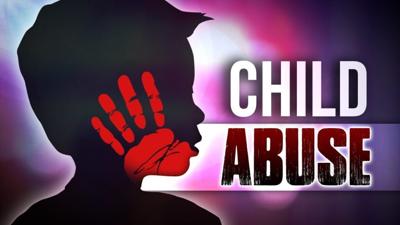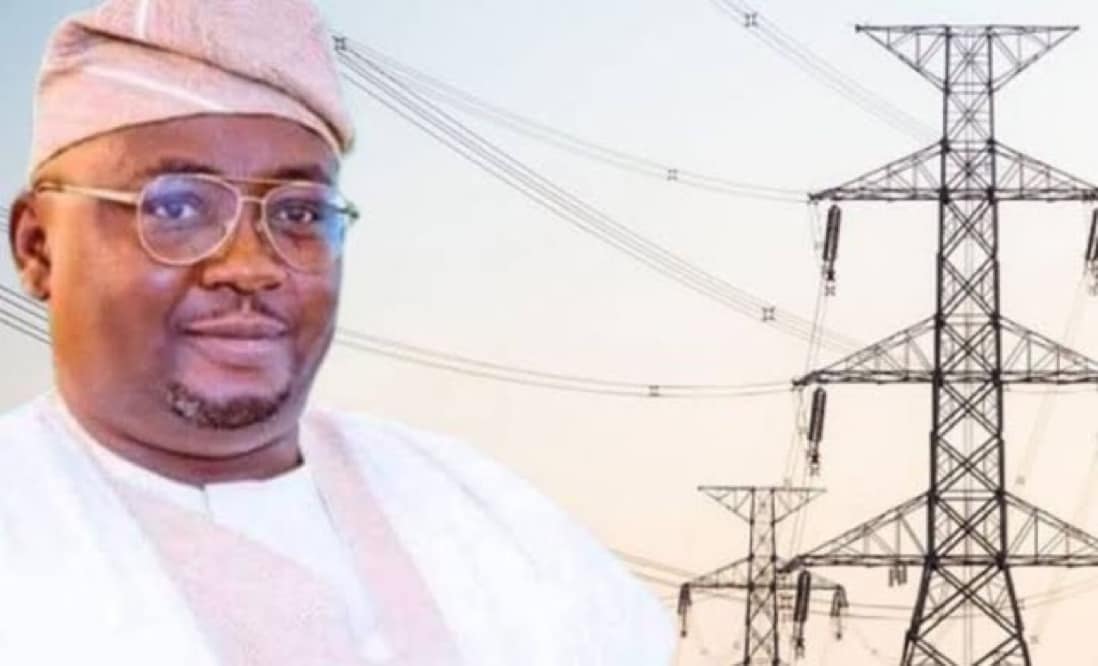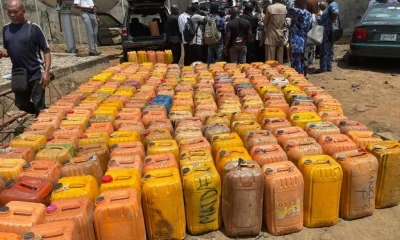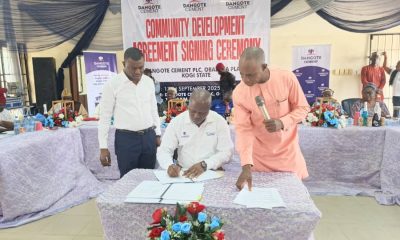Column
Conspiracy of Price Gouging Between Dangote and NNPCL

By Farooq A. Kperogi
I had said to myself and to people close to me that I would never write again on the untenably rising prices of petrol in Nigeria because when I wrote column after column to presage the unfolding petrol-price-inspired cost-of-living tragedy, scores of people across the Nigerian political divide impassionedly disagreed with me because the presidential candidates to whom they abdicated their brains in 2023 also demonized “petrol subsidies” and promised to remove them.
But the extortionate prices Nigerians are still paying for petrol in spite of the well-justified hopes that the coming on stream of the Dangote Refinery would bring down prices—and the blindingly perplexing and never-ending cascade of blame games, accusations and counter-accusations between the Dangote Refinery and the Nigerian National Petroleum Company Limited (NNPCL)—compelled me to revisit this issue.
There appears to be a well-choreographed conspiracy between the Dangote Refinery and the NNPCL to take advantage of Nigerians by keeping petrol prices unjustifiably high. This is somewhat similar to what we call price gouging in the United States.
Price gouging occurs when businesses calculatedly raise the price of goods, services, or commodities to an excessively high level, especially during a crisis or emergency when demand spikes and supply is limited. In the context of fuel, price gouging is said to occur if a company or companies sharply increase fuel prices in response to supply shortages.
Although price gouging typically happens during natural disasters, pandemics, or situations where essential goods become scarce, it can happen anytime. It is, in essence, the exploitation of consumers’ vulnerabilities during critical times. That’s what I suspect is happening in Nigeria now.
NNPCL is the sole buyer and distributor of fuel from the Dangote Refinery. It controls the supply chain and effectively excludes independent marketers from accessing the refinery’s output. That’s not free-market capitalism; that’s state capitalism. That’s not deregulation; it’s regulated deregulation.
But the Dangote Refinery’s price regime is also puzzling. Oil industry expert Mr. Dan Kunle forwarded to me a WhatsApp message that breaks down the landing cost of petrol per liter, which added up to N1107. I haven’t verified the accuracy of the claim, but I assume that it must have some credibility to deserve being forwarded by Mr. Kunle whose knowledge of the industry I have a deep admiration for.
The message says “based on publicly available data,” which it admitted “are subject to change and may vary depending on market conditions, exchange rates, and other factors,” Dangote Refinery is exempt from incurring costs related to freight (N86.48), jetty depot (N15.35), storage (N12.58), financing (N34.67), foreign exchange (N23.45), NPA charges (N10.58), NIMASA charges (N5.29), and customs duties (N51.17), and therefore should, by my calculation, charge no more than N518.35 per liter.
So it’s a mystery how Dangote and NNPCL agreed on N766. If Dangote Refinery acquired its crude oil in dollars, did it also cover salaries and operational costs in dollars? Crude oil is just one part of the overall production cost.
What’s more concerning, perhaps, is that ₦766 per liter cost seems to be the expected price even after Dangote begins purchasing crude in naira from the NNPC. How can this be justified, especially when the additional costs associated with exporting crude and importing refined products would no longer apply once Dangote receives domestic crude from October 1st?
Additionally, as my friend Professor Moses Ochonu pointed out during our August 31 “Diaspora Dialogues” show titled “Who Wants to Kill Dangote Refinery and Why,” under existing laws, NNPC is supposed to supply its own refineries with 450,000 barrels per day, which was historically sufficient to meet local demand before those refineries became defunct.That crude was never meant for export. It only started being exported after the refineries stopped functioning.
So, as Professor Ochonu pointed out, why not simply allocate that crude to Dangote Refinery, paying only for the refining process plus a modest commission or profit, and then sell the refined products to Nigerians at more affordable rates?
This approach would involve some level of subsidy, but that’s how the system was intended to function when state-owned refineries were operational.
In any case, in spite of the sustained propaganda against subsidies, every serious country on earth dispenses subsidies, including energy subsidies, to its citizens.
Nigerians are entitled to a subsidy on a quarter of the country’s crude output, and subsidizing petrol makes sense because of its broad impact on the economy.
Moreover, this method would be far less costly than the inflated and fraudulent subsidies that have been paid for imported fuel over the years.
I am, of course, aware that Nigerians have allowed themselves to be willingly brainwashed into assuming that there is no nexus between “subsidy removal” and petrol price hike. I hope the truth is becoming apparent now.
For example, in my April 29, 2023, column titled “Six Agenda Items for Tinubu’s Success,” I wrote, among other things: “Don’t increase petrol prices by other names. I know that there is now an artfully manufactured consent, particularly among the gilded classes in Nigeria, about the undesirability of ‘fuel subsidy.’
“I don’t care what it’s called, but any policy (call it deregulation, subsidy removal, appropriate pricing, etc.) that results in an arbitrary and unbearable hike in the price of petrol without a corresponding increase in the salaries of workers and an improvement in the living conditions of everyday people will sink Tinubu.
“No responsible government shies away from subsidizing the production and consumption of essential commodities for its people. I have lived in the United States, the belly of the capitalist beast, for nearly two decades, and I can tell you that governments at both federal and state levels heavily subsidize petrol consumption—in addition to agriculture.”
In response, a Facebook friend who was inebriated with anti-subsidy propaganda retorted in the comment section: “I beg to disagree on your advice of his administration not removing fuel subsidy which has become [a] cesspool of corruption…. I prefer he use resources saved from its removal on foodstuffs, health and educational facilities as well as increase salaries of workers which PMB has commenced to FG workers with the 40% peculiar allowance to its staff with effect from last January and which arrears was paid with April Salary. Other points raised are apt.”
“At this rate,” I replied sarcastically, “I pray petrol price gets to 1,000 naira per liter so that everyone will get a taste of what I’ve been talking about.”
“Speculation, speculation and speculation!” he shot back.
“Govt should be encouraged to put the refineries in good shape and encourage more private investors to build more just as Dangote and Ishiaku Rabiu [sic] are doing. All refineries should be supplied crude oil in naira and not buying in international oil prices in American dollars. Market forces would later force the prices down if monopoly is not allowed to fester just as happened when telecommunication was privatised and mtn simcard was 30k, others like Mtel, Glo, etc forced the price down and now costs next to nothing.”
Two weeks ago, I reminded him of our April 29, 2023, conversation and asked if he still stood by his arguments and what he thought about the N1,000 per liter prediction I made, which he had dismissed as “speculation.” I am still awaiting his response as I write this.
Well, Nigerians were flushed with enthusiasm at the prospect of the operation of the Dangote Refinery. They expected it to help reduce fuel prices, but the monopolistic control of NNPCL and the caginess and opacity of Dangote Refinery itself have spawned a jarring disconnect between expectations and reality.
As I have repeatedly pointed out, Nigeria, as an oil-producing country, should not withhold the reasonable expectation that its citizens benefit from lower fuel prices. To suggest otherwise is akin to giving someone a handful of cream while allowing their skin to remain parched — an act of neglect that borders on cruelty.
Nigerians could more easily reconcile with elevated petrol prices if their country were not blessed with abundant oil resources.
Denying citizens the fruits of their nation’s wealth is no different from a wealthy parent who starves their own children while justifying the neglect by pointing to the deprivation of their less fortunate neighbors. Such a parent is not only irresponsible but unworthy of the trust and care of their children.
Column
Child Abuse And Divorce: The Symbiotic Relationship

By Aliyu ‘Gbenga Abdulrasheed
CHILD ABUSE/MALTREATMENT
Child maltreatment has been described as the abuse and neglect that occurs to children under 18 years of age. It includes all types of physical, mental and emotional ill-treatment, sexual abuse, neglect, negligence and commercial or other exploitation, which result in actual or potential harm to the child’s health, survival, development or dignity in the context of a relationship of responsibility, trust or power.
To a large extent, Child abuse hurts a child. It occurs when a child experiences harm or neglect. Often times, the perpetrator is familiar to the child – a parent, family member, caregiver or family friend.
Another term for child abuse and neglect is the Adverse Childhood Experiences (ACEs). If untreated, these experiences can impact a child’s lifelong health and well-being.
However, international studies reveal that Six in every 10 children, or 400 million children under age 5 regularly suffer physical punishment and/or psychological violence in the hands of their parents and caregivers. One in every 5 women and 1 in 7 men report having been sexually abused as a child.
Consequences of child maltreatment include impaired lifelong physical and mental health, and the social and occupational outcomes can ultimately slow a country’s economic and social development.
According to a UNICEF report in June 2024, “Nearly 400 million young children worldwide regularly experience violent discipline at home.”
Every year, there is an estimated 40 150 homicide deaths recorded in children under 18 years of age, some of which are likely due to child maltreatment. This number almost certainly underestimates the true extent of the problem, since a significant proportion of deaths due to child maltreatment are incorrectly attributed to falls, burns, drowning and other causes.
Child abuse comes in different forms:
Physical child abuse – Slapping, pushing, punching, kicking, shaking or burning a child or not allowing a child to eat, drink or use the bathroom.
Emotional child abuse – Frequently verbal, involving insults, constant criticism, harsh demands, threats and yelling.
The Child sexual abuse is most often associated with rape, incest, fondling, indecent exposure, using a child in pornography or exposing a child to pornographic material.
For Medical child abuse, this comes in the form of deliberately trying to condition a child to sickness or not treating a medical condition.
The issue of Child neglect is fast becoming a norm in the present day world, given parents inability to provide for their immediate needs and support. This has adversely affected many children as most often they suffer undue neglect particularly in the areas of food, shelter, education, medical care and emotional support.
Child maltreatment is often hidden. Only a fraction of child-victims of maltreatment ever get support from health professionals.
A child who is abused is more likely to abuse others as an adult, so that violence is passed down from one generation to the next.
Preventing child maltreatment before it starts is possible. Effective prevention approaches include supporting parents, teaching positive parenting skills and enhancing laws to prohibit violent punishment.
Consequences of Child maltreatment could result in severe short and long-term physical, sexual and mental health outcomes. These include injuries to the head as earlier mentioned, and severe disability (particularly in young children), post-traumatic stress, anxiety, depression, and sexually transmitted infections (STIs) including HIV.
Adolescent girls may face additional health issues, including gynaecological disorders and unwanted pregnancy.
Maltreatment could also affect the cognitive and academic performance of a victim and is strongly associated with alcohol and drug abuse and smoking – key risk factors for non-communicable diseases (NCDs) such as cardiovascular diseases and cancer.
Maltreatment causes stress that is related to disruption in early brain development. Extreme stress can impair the development of the nervous and immune systems.
Childhood maltreatment can have severe and lasting impacts on an individual’s life. As adults, those who experienced maltreatment as children are more likely to face various challenges, including: Behavioral and Health Issues, Increased risk of violence, either as a perpetrator or victim, Mental health concerns, such as depression, Risky behaviors, including smoking, obesity, and substance misuse, Unintended pregnancy and high-risk sexual behaviors
Children who experience violence are 13% more likely to not graduate from school, contributing to educational disparities. These consequences highlight the importance of addressing childhood maltreatment and providing support to affected individuals.
Beyond all these, the economic impact, including costs of hospitalization, mental health treatment, child welfare, and longer-term health costs also impact severely in the making of an adult.
Several risk factors of child maltreatment have been identified. Not all risk factors are present in all social and cultural contexts, and the list here provides an overview when attempting to understand the causes of child maltreatment.
It is worthy of note to stress that children are the victims and are never to blame for maltreatment.
Certain characteristics or circumstances of parents or caregivers can elevate the risk of child maltreatment. These include Personal and Historical Factors such as having
difficulty bonding with a newborn lacking nurturing behavior towards the child or having experienced maltreatment themselves during childhood.
Without sounding subjective, these factors can contribute to an environment where child maltreatment is more likely to occur especially when parents have limited awareness of child development stages or possess unrealistic and inordinate expectations of the child’s behavior or abilities.
There’s no gainsaying the fact that Substance Abuse and Mental Health have had serious consequences on victims of child maltreatment. The
misuse of alcohol or drugs, including during pregnancy, low self-esteem,
poor impulse control, and the
presence of mental or neurological disorders are dire outcomes of this menace.
Environmental and Socioeconomic Factors could include Involvement in criminal activities, and Financial difficulties.
Experts have identified characteristics of the relationships within families or among intimate partners, friends and peers that may increase the risk of child maltreatment including family breakdown or violence between other family members, being isolated in the community or lacking a support network, a breakdown of support in child rearing from the extended family.
Responding and Preventing child maltreatment requires a multi sectoral approach. The earlier such interventions occur in children’s lives, the greater the benefits to the child (e.g. cognitive development, behavioural and social competence, educational attainment) and to the society (e.g. reduced delinquency and crime).
Some of the most effective and promising interventions suggest include:
Parent and Caregiver Support: Information and skill-building sessions to support the development of nurturing, non-violent parenting delivered by nurses, social workers, or trained lay workers through a series of home visits or in a community setting.
Education and life skills approaches:
Increasing enrolment in quality education that will allow children acquire knowledge, skills and experiences that build resilience and reduce risk factors for violence;
Another intervention critical to the prevention of this social menace is initiate programmes to prevent sexual abuse aimed at building awareness and teach skills to help children and adolescents understand consent, avoid and prevent sexual abuse and exploitation, and to seek help and support; and interventions to build a positive school climate and violence-free environment, and strengthening relationships between students, teachers, and administrators.
Norms and values approaches: Programmes to transform restrictive and harmful gender and social norms around child-rearing, child discipline and gender equality and promote the nurturing role of fathers.
Implementation and enforcement of laws:
Laws must be enacted to prohibit violent and ensure punishment for perpetrators and to protect children from sexual abuse and exploitation.
Response and support services:
Early case recognition coupled with ongoing care of child victims and families to help reduce reoccurrence of maltreatment and lessen its consequences must be encouraged.
To maximize the effects of prevention and care, the World Health Organisation (WHO) recommends that interventions must be delivered as part of a four-step public health approach:
DIVORCE
Divorce (also known as dissolution of marriage) is the process of terminating a marriage or marital union. It usually entails the canceling or reorganizing of the legal duties and responsibilities of marriage, thus dissolving the bonds of matrimony between a married couple under the rule of law of the particular country or state. It can be said to be a legal dissolution of a marriage by a court or other competent bodies. It is the legal process of ending a marriage.
Divorce laws vary considerably around the world, but in most countries, divorce is a legal process that requires the sanction of a court or other authority, which may involve issues of distribution of property, child custody, alimony (spousal support), child visitation/access, parenting time, child support, and division of debt. In most countries, monogamy is required by law, so divorce allows each former partner to marry another person.
Divorce is different from annulment, which declares the marriage null and void, with legal separation or de jure separation (a legal process by which a married couple may formalize a de facto separation while remaining legally married) or with de facto separation (a process where the spouses informally stop cohabiting). Reasons for divorce vary, from sexual incompatibility or lack of independence for one or both spouses to a personality clash or infidelity.
Grounds for divorce vary widely from country to country. Marriage may be seen as a contract, a status, or a combination of these.Where it is seen as a contract, the refusal or inability of one spouse to perform the obligations stipulated in the contract may constitute a ground for divorce for the other spouse.
In contrast, in some countries (such as Sweden, Finland, Australia, New Zealand), divorce is purely no fault. This means it does not matter what the reasons are that a party or parties want to separate.
They can separate of their own free will without having to prove someone is at fault for the divorce. Many jurisdictions offer both the option of a no fault divorce as well as an at fault divorce. This is the case, for example, in many states of the US, France and the Czech Republic.
Though divorce laws vary between jurisdictions, there are two basic approaches to divorce: fault based and no-fault based. However, even in some jurisdictions that do not require a party to claim fault of their partner, a court may still take into account the behavior of the parties when dividing property, debts, evaluating custody, shared care arrangements and support. In some jurisdictions, one spouse may be forced to pay the attorney’s fees of another spouse.
CAUSES
In the western world as a whole, two thirds of divorces are initiated by women.In the United States, 69% of divorces are initiated by women and this may be due to higher sensitivity to relationship difficulties.66% of all divorces occur in couples without children.
An annual study in the UK by Management Consultants, Grant Thornton, estimates the main proximate causes of divorce based on surveys of matrimonial lawyers. The main causes in 2004 were:
Adultery – 27%
Family strains (e.g., from the inlaws) – 18%
Domestic violence – 17%
Midlife crisis – 13%
Addictions, e.g. alcoholism and gambling – 6%
Workaholism – 6%
Other factors – 13%
According to this survey, husbands engaged in extramarital affairs in 75% of cases, and wives in 25%. In cases of family strain, wives’ families were the primary source of strain in 78%, compared to 22% of husbands’ families.
Emotional and physical abuse were more evenly split, with wives affected in 60% and husbands in 40% of cases. In 70% of workaholism-related divorces it was husbands who were the cause, and in 30%, wives.
The 2004 survey found that 93% of divorce cases were petitioned by wives, very few of which were contested. 53% of divorces were marriages that had lasted 10 to 15 years, with 40% ending after 5 to 10 years. The first 5 years are relatively divorce-free, and if a marriage survives more than 20 years it is unlikely to end in divorce.
Social scientists study the causes of divorce in terms of underlying factors that may motivate divorce. One of these factors is the age at which a person gets married; delaying marriage may provide more opportunity or experience in choosing a compatible partner.
Wage, income, and sex ratios are other such underlying factors that have been included in analyses by sociologists and economists.Couples with a high household income are less likely to divorce than poor couples.
Other personal factors such as attending religious services regularly and having at least one child together, also reduce the risk of divorce.
Other factors include the wedding itself: Spending relatively little money on the wedding, but having a relatively high number of guests in attendance (e.g., 50 or more people) and going on a honeymoon trip, is associated with a lower risk of divorce. High-cost weddings may strain marriages by causing debt stress.
Effects Of Divorce On Children:
Research has shown that children are greatly affected by the disunion of their parents’ marriage. In most cases these effects are displayed in academic strain, difficulty in regulating mood and emotions, and a tendency to find outlets in harmful substances or activities such as drugs, alcohol, and violence.
Academic and Socioeconomic:
Frequently, children who have experienced parental divorce have lower academic achievement than children from non-divorced families.
A review of family and school factors related to adolescents academic performance noted that a child from a divorced family is two times more likely to drop out of high school than a child from a non-divorced family. These children from divorced families may also be less likely to attend college, resulting in the end of their academic career.
Often times, academic problems are associated with children from single-parent families. Studies have shown that this may be directly related to the economic effect of divorce. A divorce may result in the parent and children moving to an area with a higher poverty rate and a poor education system, because of the financial difficulties of a single parent.
Children of divorced parents also on average achieve lower levels of socioeconomic status, income, and wealth accumulation than children of parents who remain married. These outcomes are associated with lower educational achievement.
Young men or women between the ages of 7 and 16 who had experienced the divorce of their parents were more likely than youths who had not experienced the divorce of their parents to leave home because of friction, to cohabit before marriage, and to parent a child before marriage.
Divorce often leads to worsened academic achievement in children ages 7–12, the most heightened negative effect being reading test scores. These negative effects tend to persist, and even escalate after the divorce or separation occurs.
PSYCHOLOGICAL
Divorce is associated with diminished psychological well-being in children and adult offspring of divorced parents, including greater unhappiness, less satisfaction with life, weaker sense of personal control, anxiety, depression, and greater use of mental health services. A preponderance of evidence indicates that there is a causal effect between divorce and these outcomes.
Children of divorced parents are also more likely to experience conflict in their own marriages, and are more likely to experience divorce themselves. They are also more likely to be involved in short-term cohabiting relationships, which often dissolve before marriage.
There are many studies that show proof of an intergenerational transmission of divorce, but this does not mean that having divorced parents will absolutely lead a child to divorce.
There are two key factors that make this transmission of divorce more likely. First, inherited biological tendencies or genetic conditions may predispose a child to divorce as well as the “model of marriage” presented by the child’s parents.
Children involved in high-conflict divorce or custody cases can experience varying forms of psychological distress due to conflict between their parents. Legal professionals recognize that alienating behaviors are common in child custody cases, but are cautious about accepting the concept of parental alienation.
Research shows that children can be affected 2–4 years before the separation or divorce even occurs. This can be due to parental conflict and anticipation of a divorce, and decreased parental contact. Many couples believe that by separating, or becoming legally divorced that they are helping their children, and in situations of extreme parental conflict or abuse it most likely will be beneficial.
Exposure to marital conflict and instability, most often has negative consequences on children. Several mechanisms are likely to be responsible. First, observing overt conflict between parents is a direct stressor for children.
Observational studies reveal that children react to inter-parental conflict with fear, anger, or the inhibition of normal behavior. Preschool children – who tend to be egocentric – may blame themselves for marital conflict, resulting in feelings of guilt and lowered self-esteem.
Conflict between parents also tends to spill over and negatively affect the quality of parents’ interactions with their children.
Researchers discovered that the associations between marital conflict and children’s externalizing and internalizing problems were largely mediated by parents’ use of harsh punishment and parent–child conflict.
Furthermore, by modeling verbal or physical aggression, parents “teach” their children that disagreements are resolved through conflict rather than calm discussion. As a result, children may not learn the social skills (such as the ability to negotiate and reach compromises) that are necessary to form mutually rewarding relationships with peers.
Girls and boys deal with divorce differently. For instance, girls who initially show signs of adapting well, later suffer from anxiety in romantic relationships with men.
Studies also showed that girls who were separated from their fathers at a younger age tended to be angrier towards the situation as they aged. Anger and sadness were also observed as common feelings in adolescents who had experienced parental divorce.
Curbing Child Abuse And Divorce
To curb child abuse and divorce, Priority must be given to Communication. This promotes Open Dialogue and encourages honest conversations about their feelings regarding the divorce. Make sure they know it’s okay to express their emotions.
Couples must regularly reassure their children that they are loved and that both parents will continue to be involved in their lives.
They must also maintain stability and consistent routines and ensure to Keep daily routines as normal as possible to provide a sense of stability amidst the changes.
Parents must be seen to create a stable and secure home environment, even if living arrangements change.
Separated parents must effectively work together with their ex-spouse to present a united front. Avoid speaking negatively about each other in front of the children.
To achieve cooperative planning, divorced parents must regularly engage, discuss and agree on parenting strategies, discipline, and important decisions regarding education and extracurricular activities.
As a matter of fact, divorced parents must focus on their children’s needs by always listening and validating. Be attentive to the children’s concerns and feelings. Validate their emotions and let them know it’s normal to feel upset or confused.
Genuine efforts must be made to encourage relationships. Support their relationships with both parents and extended family members.
Counseling is one critical intervention in seeking professional support in mitigating. Consider family therapy or individual counseling.
Over all, the rights of children who have been described as the bedrock of any society must be protected and revamped through a combination of efforts by the government and other relevant stakeholders using all legal frameworks, whether the international or local laws.
*Aliyu Olugbenga Abdulrasheed is a student of Prince Abubakar Audubon University Anyigba Kogi State, Nigeria.*
Column
Community Policing: Governor Ododo’s Commitment To Security Of Lives And Property Commendable

In a world where security is a paramount concern for every government, Governor Ahmed Usman Ododo’s unwavering dedication to providing adequate security for lives and property in Kogi State is a shining example of leadership excellence.
His recent recruitment of over 1000 hunters and vigilantes, fully equipped to tackle security challenges, is a testament to his resolve to ensure the safety of residents.
Governor Ododo’s commitment to security is not a mere rhetoric; it is a demonstration of his administration’s unwavering prioritization of the welfare of citizens.
By investing heavily in law enforcement and ensuring law and order, he has created an environment conducive to community policing, economic growth, foreign investment, and progress of our dear state.
Under his leadership, Kogi State has witnessed a significant reduction in crime rates, and citizens now feel safer than ever before.
The deployment of security personnel to strategic locations has bolstered confidence in the government’s ability to protect its citizens.
Governor Ododo’s security initiatives have also fostered collaboration amongst law enforcement agencies, resulting in a more effective response to security threats.
The impact of Governor Ododo’s security efforts extends beyond law and order. By providing a secured environment, he is attracting foreign investors, stimulating economic growth, and creating employment opportunities for residents.
His commitment to security has also enhanced the state’s reputation, making it an attractive destination for tourists and businesses alike.
Governor Ahmed Usman Ododo’s leadership in security is a model for other states to emulate. His unwavering dedication to the safety and security of residents has earned him the trust and admiration of citizens.
As Kogi State continues to thrive under his leadership, it is clear that Governor Ododo’s giant strides in security will leave a lasting legacy for generations to come.
Credit: Ododo Media center
Column
Nigeria’s Economic Apartheid in Electricity Consumption

By Farooq A. Kperogi
Twitter: @farooqkperogi
I am writing this week’s column from Nelson Mandela University in Port Elizabeth, South Africa, where I have come to deliver a talk on media theory. But this column isn’t about the talk or about South Africa. It’s about the enduring problems of electricity generation and distribution in Nigeria, which I have brooded over for quite some time.
It’s ironic that I am writing about Nigeria’s new economic apartheid in electricity consumption from the previous land of apartheid where electricity is a human right, where even the poorest of the poor “have a public law right to receive electricity” even before the abolishment of apartheid, according to F. Dube and C.G. Moyo in their 2022 article titled “The Right to Electricity in South Africa.”
I’m not sure there’s any modern country on earth where electricity is as precarious, as insufficient, as unreliable, and as socially stratified as it is in Nigeria. The hierarchization of electricity distribution into “bands” in which people classified as “band A” (read: the wealthy) get the most electricity and people classified as “Band E” (read: the most economically disinherited) get the least electricity is the most starkly state-sanctioned economic discrimination I have ever seen anywhere in the world. President Bola Tinubu should order that the bands be disbanded forthwith. This is embarrassing official idiocy.
The point isn’t even that so-called Band A electricity consumers don’t actually get the amount of electricity that their socio-economic status should guarantee them, according to the new state-sponsored economic apartheid that imposes discrimination on electricity consumers. The outrage is that the government would conceive of a program where a resource as indispensable to modern life as electricity is rationed on the basis of economic status.
Electricity is the cornerstone of development. It isn’t a privilege. It should be a human right. It should be accessible to everyone. It’s the driver of economic development, is indispensable to healthcare, is the backbone of education, supports modern agricultural practices, is fundamental to technological progress, powers social development, and enhances quality of life.
The government’s goal should be to generate and distribute “Band A” electricity for all consumers in Nigeria—like is done in other countries, including countries much less endowed than Nigeria.
As I pointed out in a previous column, the depth of Nigeria’s electricity problems didn’t become magnified in my consciousness until July 2009 when I visited my mother’s maternal relatives in the city of Parakou, the capital of Borgou State (or, as states are called there, “Department”) in Benin Republic. Throughout the one week I stayed in Parakou, Benin Republic’s third largest city with a little over a quarter of a million people, electricity didn’t blink for even a split second.
Except for the distinctive sights, sounds, and smells of the city, it felt like I was still in the United States.
To be sure that the impressively continuous electricity we enjoyed wasn’t a fluke, I asked my mother’s first cousin (that would be my “first cousin once removed” in Standard English and my “uncle” in Nigerian English) in whose house we stayed to tell me the last time they lost power in the city or in the neighborhood.
He started to jog his memory and even enlisted the help of his wife because he thought I needed to know the exact day for record purposes. I told him not to bother, but I later learned from him that although power outages occur, often for maintenance, they are infrequent, relatively brief, and often announced ahead of time in the broadcast media.
This is particularly interesting because Benin Republic buys most of its electricity from Nigeria, although my cousin said that wasn’t true of Parakou. Most importantly, though, there was no invidious social differentiation of electricity consumers into “bands.” If there was, my relative in Parakou would be in “Band E” because he retired from the Beninese civil service on a modest rank.
Almost every Nigerian I know who has traveled outside Nigeria shares the same experience as mine. A former colleague of mine at the Presidential Villa in Abuja who traveled to Iran for weeks returned and told us he didn’t witness power outage for even a fraction of a second throughout his stay in the country, which caused him to insist that if Iran was a “Third World” country, Nigeria must be a “10th World” country.
And that leads me to the question: why has it been impossible to power Nigeria? Why does every other country on earth seem to be doing better than Nigeria in electricity generation and distribution? I think it’s because we have never had anyone with a clue to manage Nigeria’s power sector. Let’s look at some of the ministers of power we’ve had since 1999.
In 1999, the late Chief Bola Ige, who became the minister of power, promised to “turn stone to bread.” He was deploying a biblical metaphor to imply that he would make the seemingly impossible possible. Well, he didn’t have a stone to start with, so there was no bread. His legacy was darkness.
On November 28, 2012, the then Minister of State for Power, Hajia Zainab Kuchi, told South African investors that “evil spirits” were to blame for Nigeria’s interminable electricity troubles. “We must resolve to jointly exorcise the evil spirit behind this darkness and allow this nation take its pride of peace [sic] in the comity of nations [sic],” she said.
About two months later, her metaphysical explanation for Nigeria’s electricity difficulties got a professorial endorsement when, on January 23, 2013, Chinedu Nebo, a professor of engineering and former university vice chancellor, told the Nigerian senate that power outages were caused by “witches and demons” and that “If the President deploys me in the power sector, I believe that given my performance at the University of Nigeria, Nsukka, where I drove out the witches and demons, God will also give me the power to drive out the demons in the power sector.”
He got the job. But neither he nor Kuchi were able to exorcise the “evil spirits,” “demons,” and “witches” that they believed sucked the megawatts out of Nigeria’s power plants. Their legacy was more darkness.
Then on July 11, 2014, Babatunde Fashola said Nigeria’s electricity problems were political, even electoral. “The only way you and I will have electricity in this country,” he said, “is to vote out the PDP.”
Again, at the 7th Annual Bola Tinubu Colloquium on March 25, 2015, Fashola blamed “amateurs” for Nigeria’s power generation problems. He infamously said, “Power generation is not rocket science; it is just a generator. So just remember and imagine that your ‘I-better-pass-my-neighbour’ in one million times—its capacity but in one place. So, if you can make that size of one kilowatt, you can make a power turbine of one thousand megawatts…
“So, with all the billions of dollars that have been spent, the story is that we still live in darkness. Our government lies about it, but it is not because power is impossible. But to tell you very confidently that we do not have power because power is difficult to generate; we have darkness because we have incompetent people managing our economy. As one of my friends fondly calls them, our economy is being managed by amateurs.”
He was appointed the minister in charge of power a few months after this overconfident political diagnosis of Nigeria’s unending electricity woes. Within a few months of being in power, disappointed Nigerians nicknamed him the “minister of darkness,” and Buhari didn’t reappoint him to the ministry for a second term.
He was replaced by a man who didn’t know what his job was supposed to entail, who didn’t know he was the minister of power, who was so colorless and so uninspiring that no one knew him when he held sway, much less remember him after his tenure expired.
So, from 1999, we went from treating our electricity problem as one that could be resolved through Ige’s poetic and theological flourishes to thinking that Nebo’s and Kuchi’s metaphysical delusions provided the keys to unlocking it, to imagining that Fashola’s two-bit, evidence-free, exaggeratedly partisan outbursts were any good, to the unpretentious shallowness of Fashola’s successor.
Now we have an Adebayo Adelabu, a completely clueless, unfeeling buffoon who is clearly out of his depth, as the minister of power. Here is a minister of power who is so hopelessly ignorant about power that he thought keeping freezers connected to electricity continuously was a waste of power that was peculiar to Nigeria and has championed the idiotic social stratification of electricity consumers.
Now he says if Nigerians are not prepared to pay an arm and a leg for electricity, they should come to terms with perpetual darkness. What kind of responsible government official says that?
This is especially tragic because everyone knows that electricity is the driving force of technology and innovation, not to mention basic creative comforts. Any country that can’t fix its electricity can’t participate in the increasingly digital economy of the 21st century and will be stuck in permanent developmental infancy.
Yet, in spite of the drag that poor electricity exerts on creativity and innovation, Nigeria’s youth have been some of the world’s most high-flying digital creators and drivers. Imagine what Nigeria would be if it had a leadership that cared and knew how to fix its electricity crisis.
-

 News1 year ago
News1 year agoKogi Police Prohibits, Warns Against Use of Vehicles With Covered Number Plates
-

 News1 year ago
News1 year agoHow We Discovered Drugs In The Residence of Kwara Senator Accusing Us of Corruption. – NDLEA
-

 News2 years ago
News2 years agoKogi Govt. Commences Staff Audit For State Civil Servants Dec. 5th
-

 Politics2 years ago
Politics2 years agoKOGI2023: AA’s Candidate, Braimoh, Promises To Regenerate State’s Economy, Receives Decampees
-

 News2 years ago
News2 years agoPDP Will Expel Wike At Appropriate Time – Bwala
-

 News3 years ago
News3 years agoWAEC Releases 2022 WASSCE Results
-

 News3 years ago
News3 years agoSen. Smart Adeyemi Set To Kick-off N250M Empowerment Programs In Kogi West
-

 Solicited2 years ago
Solicited2 years agoYAHAYA BELLO: The Generalissimo!















